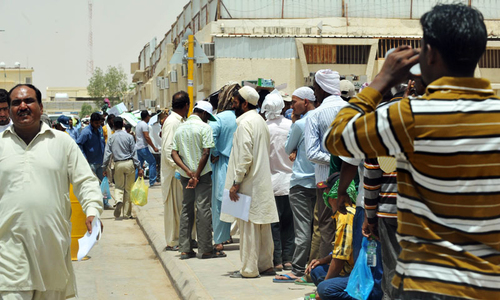Saudi Arabia on Thursday projected a 2017 budget deficit of about $53 billion and a lower than expected shortfall for this year after government cost-cutting in response to lower oil prices.
Expenses next year will reach $237bn against revenues of $184bn, the cabinet said in a statement.
It said this year's deficit will be $79bn, down 8.9 per cent from 2016's budget forecast.
“This budget comes at a time of a highly volatile economic situation, and which led to a slowdown in world economic growth and a drop in oil prices that impacted our country,” King Salman said on official television, with Finance Minister Mohammed Aljadaan seated nearby at a table of cabinet ministers.
Revenues for this year are expected to be 528bn riyals, higher than projections a year ago of 513.75bn, the cabinet said.
Spending is expected to come in at 825bn riyals for 2016, 1.8pc lower than foreseen.
The world's biggest oil exporter froze major building projects, cut cabinet ministers' salaries and imposed a wage freeze on civil servants in the wake of last year's record deficit of $97bn.
Analysts said that figure was 15pc of gross domestic product, making it one of the largest in the emerging world.
The government made unprecedented cuts to fuel and utilities subsidies last year in a country long accustomed to some of the cheapest petrol prices in the world.
A year of cutbacks left retailers complaining of lower sales and residents saying they had less money to spend.
“Given the opaqueness of policy announcements, the budget will provide investors with an opportunity to gauge the government's commitment to fiscal austerity,” London-based Capital Economics wrote in a pre-budget briefing.
Oil prices, which were above $100 a barrel in 2014, sank below $40 in 2016 but recovered towards the end of this year and traded on Thursday below $55.
The plunge in global oil prices led Riyadh to intensify economic reform efforts, which are being led by Salman's son, Deputy Crown Prince Mohammed bin Salman.
In April the prince released the Vision 2030 programme for diversifying the oil-dependent economy.
At its heart is a plan to float less than five per cent of state oil giant Saudi Aramco on the stock market, with the proceeds helping to form what will be the world's largest state investment fund, holding about $2 trillion in assets.
The IPO could take place in 2018 and would be the biggest in history.













































